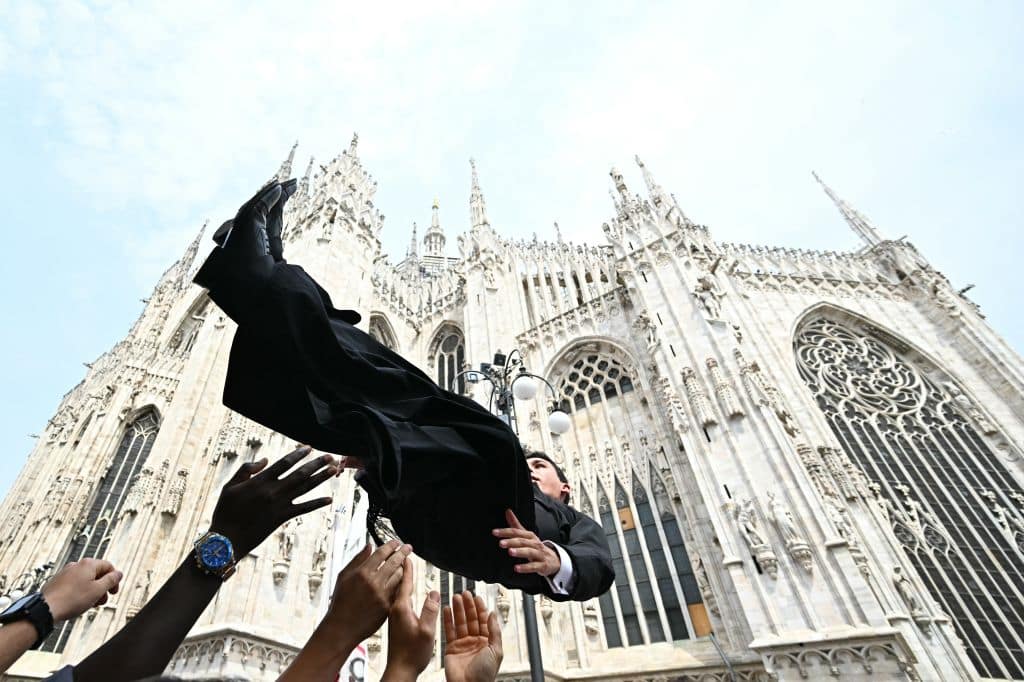In the realm of astrodynamics the so-called Three-Body Problem is one of the oldest challenges in celestial mechanics. It focuses on trying to explain the motion of three celestial bodies interacting with each other through gravity.
The orbital dilemma is also the name of the cult 2008 science-fiction novel by the Chinese author Liu Cixin, the first in a series that portrays a fictional past, present and future during which Earth encounters an alien civilisation from a star system with three Sun-like stars orbiting one another.
These intergalactic questions and triptych-related mysteries bring to mind questions and debates around the Holy Family; and around the past, present and future of the Catholic Church. This was brought home to me attending Sunday Mass earlier this month, when I was confronted by a challenging sermon.
The priest, a kindly Irishman, explained in the homily that Mary’s perpetual virginity was not actually true and that Our Lady and St. Joseph went on to parent more children after Jesus.
Catholic belief posits that Jesus did not have uterine siblings. The general hypothesis is that the Gospels' mention of Jesus's “brothers and sisters” refers to his cousins. In Aramaic, the native language of Matthew, there is no word for cousin, and the Greek word <em>adelphos</em>, meaning brother – and used to describe James, Joseph, Simon and Jude’s relationship to Jesus in the Gospel of Matthew – is used not only to describe uterine siblings but also a range of male relationships.
Given that James and John are also referred to as the children of Mary the wife of Cleophas, and Cleophas is generally considered to be Joseph's brother, it actually takes a more significant leap of faith to assume they could be the children of Our Lady.
The tradition of Mary’s perpetual virginity originates from the earliest Christian texts. The non-canonical Gospel of James (also known as the <em>Protoevangelium of James</em>) asserts Mary’s perpetual virginity in the second century, and St. Jerome wrote about it during the 4th century in <em>On the Perpetual Virginity of Blessed Mary Against Helvidius</em>.
St. Jerome also notes that Ignatius (35–107 AD), Polycarp (69–155 AD) and Justin Martyr (100–165 AD) all held the same views as himself. Origen, writing in 248 AD, also affirms that “Mary, as those declare who with sound mind extol her, had no other son but Jesus".
The Irish priest's heretical homily concluded with an effusive plea for parishioners to take part in the Synod on Synodality, as “we need to modernise our Church for young people”.
I, however, while being one of the youngest members of the congregation, made a mental note not to attend Mass at this church again. If I wanted to be purged of my Catholic beliefs, I did not need the priest's whimsical interpretations of scripture – secularised society will obviously suffice.
But the experience caused me to reflect on the ongoing rift between the different generations of Christendom. Younger Catholics, by and large, seem to be attracted to orthodox teaching and reverent worship, whereas older Catholics often find solace in less rigid doctrine and a liturgy adapted to the needs of the time and culture.
In November 2023, this anecdotal observation was supported by a major study of Catholic priests in the United States. The Catholic Project, a research group at The Catholic University of America in Washington, D.C., surveyed 3,516 priests across 191 of the 196 dioceses and eparchies in the United States, which included 67 per cent of the country's bishops.<br><br><strong><em>RELATED: <a href="https://catholicherald.co.uk/us-priesthood-riven-by-generational-mistrust-as-conservative-shift-leaves-younger-priests-suspicious-of-church-hierarchy/"><mark style="background-color:rgba(0, 0, 0, 0)" class="has-inline-color has-vivid-cyan-blue-color">US priesthood riven by ‘generational mistrust’ as conservative shift leaves younger priests ‘suspicious’ of Church hierarchy</mark></a></em></strong>
The report showed a significant divide between older priests and those recently ordained. Just 20 per cent of priests ordained before 1960 described themselves as theologically “conservative/orthodox” or “very conservative/orthodox”, compared to 85 per cent of priests ordained after 2020. Perhaps most strikingly, no surveyed priests ordained after 2020 described themselves as theologically “very progressive”.
This generational difference is further enhanced by the geographical shift of Catholicism to the global South. The African Church, generally considered more conservative, orthodox and dynamic, is considerably younger.
During the 20th century, the number of Catholics in Sub-Saharan Africa grew by 6,708 per cent, and in Nigeria, 94 per cent of Catholics attend Mass at least weekly. The total number of African ordinations surpassed Europe for the first time in 2019, and the continent is training 34,000 priests in its major seminaries, constituting about 31 per cent of seminarians globally.
This apparent conflict between two generations is, in fact, moving inexorably toward a harmonious, if somewhat macabre, solution. Bishop Strickland noted in a recent interview with the <em>Herald</em> that while his Catholic conservatism is an aberration for his age group, his “generation is fading away”. What will be left is an increasingly more conservative and orthodox Church.<br><br><strong><em>RELATED: <a href="https://catholicherald.co.uk/podcast/the-splendour-of-the-truth-with-bishop-joseph-strickland/?swcfpc=1"><mark style="background-color:rgba(0, 0, 0, 0)" class="has-inline-color has-vivid-cyan-blue-color">Episode 84: The splendour of the truth, with Bishop Joseph Strickland</mark></a></em></strong>
There will likely also be a talent gap. Pope Francis has appointed 72 per cent of the current cardinalate. Having a liberal outlook will likely be a career enhancer over the coming decades as it becomes increasingly difficult to find a priest with such tendencies.
But, ultimately, in the not-too-distant future, we will be a much more melanated and conservative Church, at least among our leadership, and the liturgical and theological experimentalism of the 1970s and 1980s will fade away.
For those of us with a more traditional outlook, it can be tempting to be triumphant about this. However, it is important to remember that as a Church we remain indebted to those who have gone before us. The Church, in its fullness and tradition, is a gift that has been handed on to us only by sacrifice.
The well-meaning priest that I disagreed with over the Virgin Mary comes from a generation of Irishmen that, perhaps more than any other, gave their lives so that we might have the sacraments.
So, while Catholics must certainly discourage the heterodoxy and liturgical abuse that still permeates parts of the Church, we must remember to show a healthy degree of respect to our ecclesiastical forebears.
They have done what they felt God was calling them to do in their particular context, and have carried the torch and flown the flag when many did not. It will now be up to their more traditional successors to decide what kind of Church they will pass on to those that follow them.<br><br><strong><em>RELATED: <a href="https://catholicherald.co.uk/africa-calling-westerners-must-accept-that-catholicisms-centre-of-gravity-is-shifting/?swcfpc=1"><mark style="background-color:rgba(0, 0, 0, 0)" class="has-inline-color has-vivid-cyan-blue-color">Africa calling: Westerners must accept that Catholicism’s centre of gravity is shifting</mark></a></em></strong>
<em>Photo: A newly ordered Catholic priest is tossed in the air during celebrations with friends and relatives outside Milan's Duomo Cathedral, following the ordination ceremony, Milan, Italy, 8 June 2024. (Photo by GABRIEL BOUYS/AFP via Getty Images.)</em>



